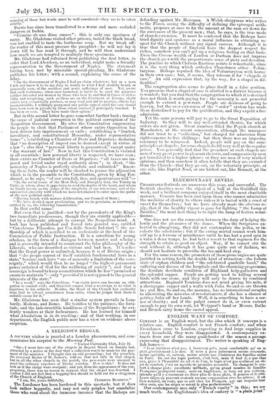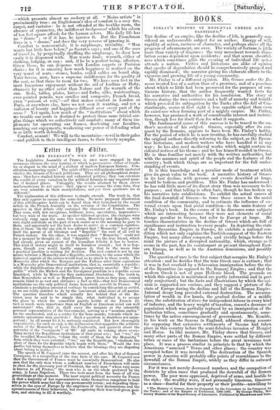ENGLISH WANT OF COMFORT.
COMFORT is an English word, but the idea which it conveys is relative one. English comfort is not French comfort; and when Frenchmen came to London, expecting to find large supplies. in every household, they were disappointed. A contemporary ex- tracts from one of the many guidebooks of the season a passage expressing that disappointment. The writer is speaking of Eng- lish homes- " Lear interieur n'est pas, I bcaucoup pri)s, :mud comfortable qu' on ae plait generalement a le dire. II nous a paru infinement moms commode, moms agreable, et, surtout, moms artiste qua l'interieur des families deems de Paris. 118 oat des tapis partout, c'est vrai, mais ii fent Lc qua char mix, grace 1 l'humidite du sol et de Pair, le tapis n'est pas seulmeet tin ob- jet de comfort, c'est an meuble de premiare necessite. Ils changent he con- vert I cheque plat; excellente methods, cku'ua grand nombre do families Francaises pratiquent aussi; male en An ter re, cc lux i eat pen coateux, attendu qu'd y a rarement an diner phis de deux. plats, le looisson at he rot- Leurs sieges ne peueent soutenir aucune comparaison avec lea names; il est bien naturel, du rests, qua ee soil chits lea Francais, qui ont toujours. taut Teem assis, quo lea sieges se soient he pine perfectionnee." Our contemporary sees only "French vanity' in this; we see ranch truth. An Englishman's idea of cookery is " &pinta joinl" —which presents almost no cookery at all "Moms artiste" is preeminently true : an Englishman's idea of comfort is a cosy fire, carpet, and curtains : he is not offended at the boxlike room, the absence of symmetry, the indifferent background which his saloon of ten feet square affords for the human actors. His daily life has no " drama °; or if it has, he ignores it. But the Frenchman lives in a " drame," and does the very reverse of ignoring it. Comfort is nonessential; it is surplusage, triviality. "Man wants but little here below," as Socrates says ; and one of the uses of travel is, by perpetually shuffling the surplusage, to show how easily it is dispensed with. Man wants food ; warmth, either of clothing, lodging, or sun ; and, if he be a perfect being, affection. Given those, he can dispense with London carpets or Parisian chairs; for it is amazing how much happiness is realized on the very worst of seats—stones, banks, coiled cables on board ship. Your lovers, now, have a supreme indifference for the quality of the seat, so that there be room for two. We have seen feet in the most luxurious enjoyment without the aid of Ludlam or Hoby, chausses by no other artist than Nature and the warmth of the sun. Beds, tables, plates, knives and forks, silks, waistcoatings, ever-pointed pencils, wax candles and composite, French bread, even "poisson at roti,"—all that makes comfort in London or Paris, or anywhere else, have we not seen it wanting, and yet a radiance of beauty and happiness diffused over every part of the scene ? Yet again, how much of the "institutions" about which we trouble our souls is destined to protect those same trivial sur- plus things which we collectively call comfort ; many of them im- plements for enervating our frames, deadening our faculties, numbing our enjoyments weakening our power of defending what is so little worth defending.
Comfort, avaunt ! We will to the mountains—revel in their gales —and publish to their intelligent fauns, to their lovely nymphs.



























 Previous page
Previous page